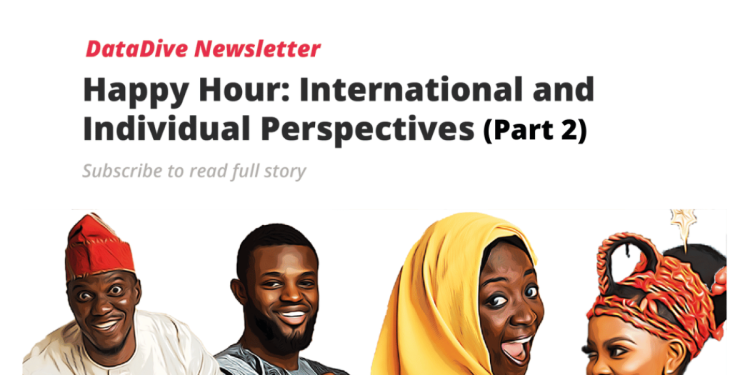Yipee! 🕺
That’s not exactly how I feel today.
Why?
As promised last weekend, I have to share my happiness test score, and it returned I’m neither happy nor unhappy.
Considering how much joy and smiles I exude, I can’t believe I may not be standing firmly on the 5th step of life’s 10-step Happiness Ladder yet.
It turns out I’m like the majority of Nigerians who see themselves a little short of reaching that middle level of happiness with a national score of 4.98 over 10.
Wait a second!
Recall one of Papa Davina’s words of wisdom from last weekend: Perspective is all.
Maybe I’m happier than I think.
The governments in Nigeria may be right.
Maybe they have democratised happiness for the majority of Nigerians such that we are all really on the eighth step, above the Finns, as the happiest people on earth.
Maybe my low happiness test score was rigged. Then I should go to the courts. 🏃
The courts? No way. That’s not a good idea.
The justices work on factual evidence. And on more occasions, the evidence would imply that Nigerians are among the happiest people on earth.
The justices work on factual evidence. And on more occasions, the evidence would imply that Nigerians are among the happiest people on earth.
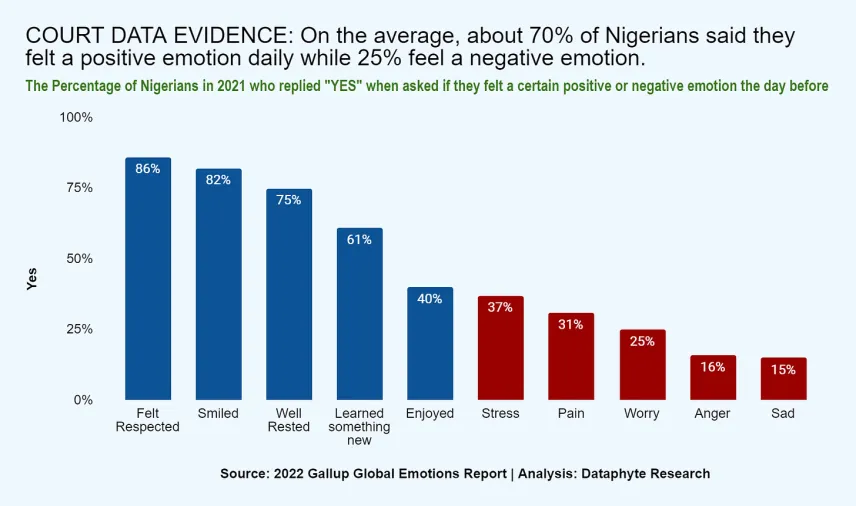
For instance, Ms Joy is in court because she is unable to pay back debts owed to her lenders. The single mother explains to the court that her business is bad, she can’t afford her rent, feed or pay the school fees of her three kids alone.
The Magistrate then asks: “Ms Joy, are you happy?”
Ms Joy, a Nigerian indeed, shakes her head, smiles back at the Judge, and says: “As you can see Sir, I am not happy.”
If the Judge ventures to confirm the evidence before her and asks again: “Ms Joy are you sad?” She might burst into laughter and reply, not like that, Sir, I’m just saying things are not easy for me”
“Okay, I get that things are not easy, Ms Joy. But, for the record, I just want to know if you are sad.” The confused Judge finally attempts.
At this point, Ms Joy may brace herself up, look directly at the Judge’s face and say: “I am not sad Sir. It’s just that I don’t have any means of paying my debts or to even take care of myself and my kids.”
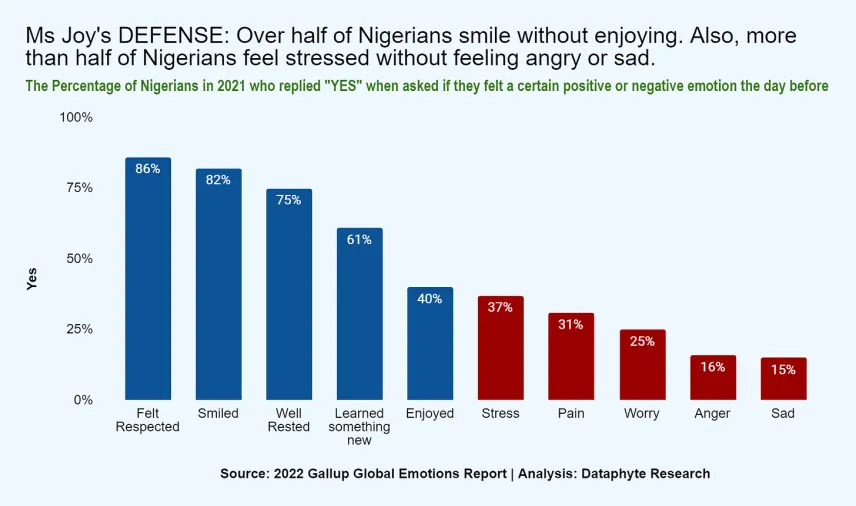
Ms Joy’s conflicted feelings, like many Nigerians, are the concerns of Soyinka in his latest novel, “The Happiest People on Earth”.
The problem is not that Nigerians suffer. It is that they exude happiness while at it.
This is why despite the higher levels of stress (37%), pain (31%), worry (25%), and anger (16%) Nigerians feel, sadness is the least felt emotion. Only 15% of Nigerians feel sad daily, according to the 2022 Gallup Global Emotions Report.
Instead, 86% of Nigerians said they felt respected, 82% smiled, 75% felt well-rested, 61% learned something new (in a formal or informal training centre), and 40% said they enjoyed the day before they were interviewed.
This sampled street evidence seems to contradict the expected higher emotions of sadness and depression among Nigerians, going by the extent of bad events reported on conventional news media and social media.
Fela Anikulapo Kuti worried about this endemic masochistic mien exuded by Nigerians in many of his songs. To many Nigerian Theists, it’s okay to “suffer suffer for world” so long they don’t suffer in heaven or in another life.
Thus, suffering does not lead to sadness. Instead, it leads to smiles. 😲
Does this conflicted response to suffering resonate with you? This is how you can know.
Below is the happiness test I took. Why don’t you take it right away, so you know if your level of smiles is more or less than your level of enjoyment? 😊
Attempt this Oxford Happiness Questionnaire by Dr. Steve Wright:

The Questionnaire (29 Questions)
(Record your score in a sheet of paper for each question ranging from 1 to 6.)
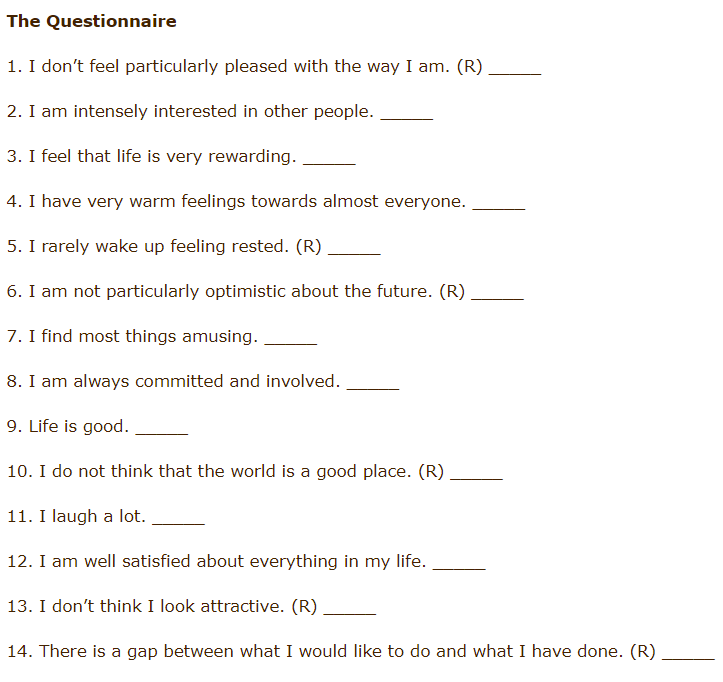
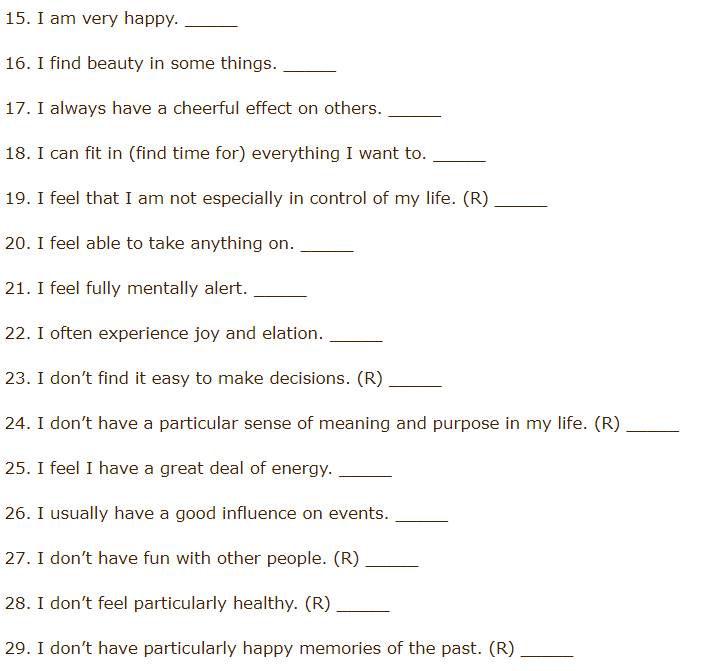
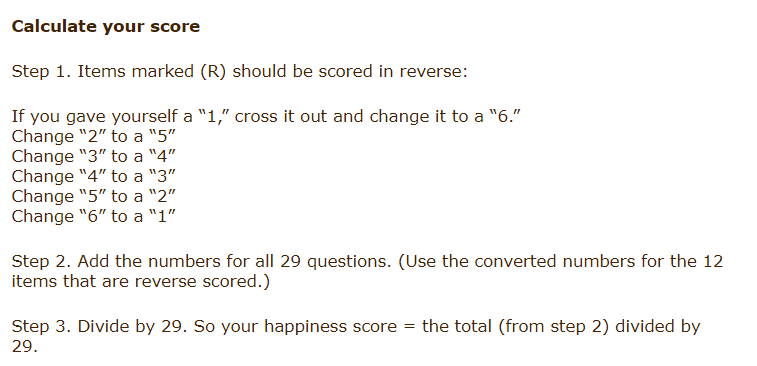
INTERPRETATION OF SCORE
I suggest you read all the entries below regardless of what score you got, because I think there’s valuable information here for everyone.
This is what your average score means:
1-2 = Not happy. If you answered honestly and got a very low score, you’re probably seeing yourself and your situation as worse than it really is.
2-3 = Somewhat unhappy.
3-4 = Not particularly happy or unhappy. A score of 3.5 would be an exact numerical average of happy and unhappy responses. But according to Dr. Steve Wright, the average person gets a score of about 4.
4 = Somewhat happy or moderately happy. Satisfied. This is what the average person scores.
4-5 = Rather happy; pretty happy.
5-6 = Very happy. Being happy has more benefits than just feeling good. It’s correlated with benefits like health, better marriages, and attaining your goals.
6 = Too happy. Yes, you read that right. Recent research seems to show that there’s an optimal level of happiness for things like doing well at work or school, or for being healthy, and that being “too happy” may be associated with lower levels of such things.
So what’s your average score? What is the interpretation of your average score?
Do you think the level of smiles and happiness you exude justify your score?
So, again, I scored 3.9655 or say 3.97. That puts me below people’s average test score of 4.
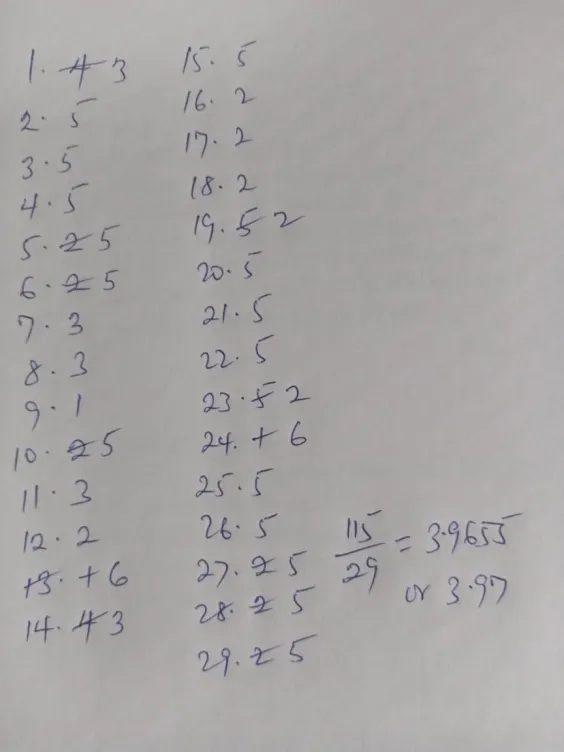
This means, as an individual, I would score 5.5 on the 10-step happiness ladder (my 3.97 score divided by 4 (the average score on the Oxford Test) multiplied by 5.54 (the world average on the Gallup Global Emotions).
Not too bad. I pass my neighbour 🤭. The average Nigerian is on 4.98 on the 10-step happiness ladder.
Continue reading

